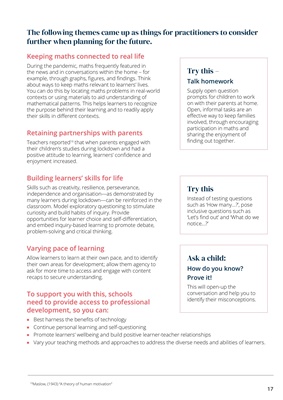
17
The following themes came up as things for practitioners to consider
further when planning for the future.
Keeping maths connected to real life
During the pandemic, maths frequently featured in
the news and in conversations within the home - for
example, through graphs, figures, and findings. Think
about ways to keep maths relevant to learners' lives.
You can do this by locating maths problems in real-world
contexts or using materials to aid understanding of
mathematical patterns. This helps learners to recognize
the purpose behind their learning and to readily apply
their skills in different contexts.
Retaining partnerships with parents
Teachers reported19 that when parents engaged with
their children's studies during lockdown and had a
positive attitude to learning, learners' confidence and
enjoyment increased.
Building learners' skills for life
Skills such as creativity, resilience, perseverance,
independence and organisation-as demonstrated by
many learners during lockdown-can be reinforced in the
classroom. Model exploratory questioning to stimulate
curiosity and build habits of inquiry. Provide
opportunities for learner choice and self-differentiation,
and embed inquiry-based learning to promote debate,
problem-solving and critical thinking.
Varying pace of learning
Allow learners to learn at their own pace, and to identify
their own areas for development; allow them agency to
ask for more time to access and engage with content
recaps to secure understanding.
To support you with this, schools
need to provide access to professional
development, so you can:
l Best harness the benefits of technology
l Continue personal learning and self-questioning
l Promote learners' wellbeing and build positive learner-teacher relationships
l Vary your teaching methods and approaches to address the diverse needs and abilities of learners.
Try this -
Talk homework
Supply open question
prompts for children to work
on with their parents at home.
Open, informal tasks are an
effective way to keep families
involved, through encouraging
participation in maths and
sharing the enjoyment of
finding out together.
Try this
Instead of testing questions
such as 'How many…?', pose
inclusive questions such as
'Let's find out' and 'What do we
notice…?'
Ask a child:
How do you know?
Prove it!
This will open-up the
conversation and help you to
identify their misconceptions.
19Maslow, (1943) "A theory of human motivation"